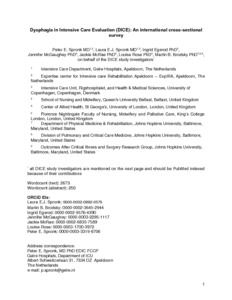Spronk, PE; Spronk, LEJ; Egerod, I; McGaughey, J; McRae, J; Rose, L; Brodsky, MB; DICE study investigators
(2022)
Dysphagia in Intensive Care Evaluation (DICE): An International Cross-Sectional Survey.
Dysphagia, 37 (6).
pp. 1451-1460.
ISSN 1432-0460
https://doi.org/10.1007/s00455-021-10389-y
SGUL Authors: McRae, Jacqueline
![[img]](https://openaccess.sgul.ac.uk/114636/6.hassmallThumbnailVersion/spronk_DICEstudy_dysphagia_complete%20version-R1%5B20013%5D.pdf)  Preview |
|
PDF
Accepted Version
Available under License ["licenses_description_publisher" not defined].
Download (429kB)
| Preview
|
Abstract
Dysphagia occurs commonly in the intensive care unit (ICU). Despite the clinical relevance, there is little worldwide research on prevention, assessment, evaluation, and/or treatment of dysphagia for ICU patients. We aimed to gain insight into this international knowledge gap. We conducted a multi-center, international online cross-sectional survey of adult ICUs. Local survey distribution champions were recruited through professional and personal networks. The survey was administered from November 2017 to June 2019 with three emails and a final telephone reminder. Responses were received from 746 ICUs (26 countries). In patients intubated > 48 h, 17% expected a > 50% chance that dysphagia would develop. This proportion increased to 43% in patients intubated > 7 days, and to 52% in tracheotomized patients. Speech-language pathologist (SLP) consultation was available in 66% of ICUs, only 4% reported a dedicated SLP. Although 66% considered a routine post-extubation dysphagia protocol important, most (67%) did not have a protocol. Few ICUs routinely assessed for dysphagia after 48 h of intubation (30%) or tracheostomy (41%). A large proportion (46%) used water swallow screening tests to determine aspiration, few (8%) used instrumental assessments (i.e., flexible endoscopic evaluation of swallowing). Swallowing exercises were used for dysphagia management by 30% of ICUs. There seems to be limited awareness among ICU practitioners that patients are at risk of dysphagia, particularly as ventilation persists, protocols, routine assessment, and instrumental assessments are generally not used. We recommend the development of a research agenda to increase the quality of evidence and ameliorate the implementation of evidence-based dysphagia protocols by dedicated SLPs.
| Item Type: |
Article
|
| Additional Information: |
This version of the article has been accepted for publication, after peer review (when applicable) and is subject to Springer Nature’s AM terms of use (https://www.springernature.com/gp/open-research/policies/accepted-manuscript-terms), but is not the Version of Record and does not reflect post-acceptance improvements, or any corrections. The Version of Record is available online at: http://dx.doi.org/0389-y |
| Keywords: |
Critical care, Dysphagia, Intensive care, Survey, Swallowing, DICE study investigators, Critical care, Dysphagia, Intensive care, Survey, Swallowing, 1103 Clinical Sciences, Speech-Language Pathology & Audiology |
| SGUL Research Institute / Research Centre: |
Academic Structure > Institute of Medical & Biomedical Education (IMBE) |
| Journal or Publication Title: |
Dysphagia |
| ISSN: |
1432-0460 |
| Language: |
eng |
| Dates: |
| Date | Event |
|---|
| December 2022 | Published | | 29 January 2022 | Published Online | | 31 October 2021 | Accepted |
|
| Publisher License: |
Publisher's own licence |
| Projects: |
| Project ID | Funder | Funder ID |
|---|
| 2018-012 | Gelre Hospitals Science Fund | UNSPECIFIED |
|
| PubMed ID: |
35092486 |
| Web of Science ID: |
WOS:000749035100002 |
 |
Go to PubMed abstract |
| URI: |
https://openaccess.sgul.ac.uk/id/eprint/114636 |
| Publisher's version: |
https://doi.org/10.1007/s00455-021-10389-y |
Statistics
Item downloaded times since 31 Aug 2022.
Actions (login required)
 |
Edit Item |



